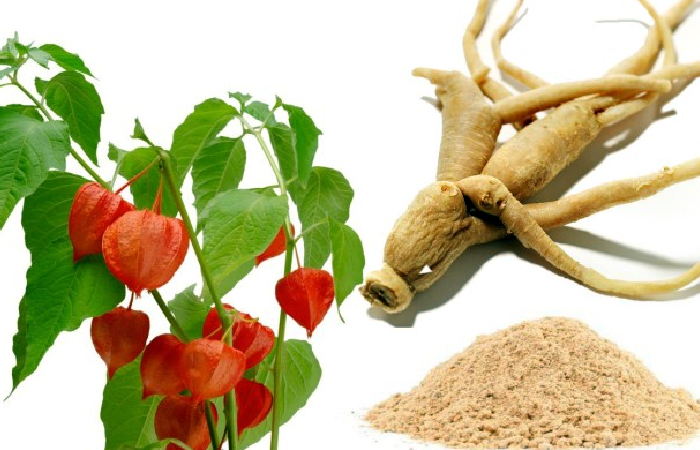9 Proven Health Benefits Of Ashwagandha (Withania Somnifera)

Are you looking for a natural way to improve your overall health and wellness? Look no further! Ashwagandha is an ancient herb that has been used for centuries in traditional Indian medicine.
Whether you're dealing with stress and anxiety or looking to boost your immunity, ashwagandha can offer a natural solution that's backed by centuries of use and scientific research. This powerful herb can also help with reducing inflammation, improving brain function, lowering cholesterol and blood sugar levels, and even increasing muscle mass and strength.

What Is Ashwagandha?
It is a tiny shrub with yellow blooms that is indigenous to Southeast Asia and India. There are several illnesses that can be treated using extracts or powder from the plant's roots or leaves, including anxiety and problems with conception. While Ashwagandha has been used for centuries in traditional medicine, it's only recently that science has begun to uncover many health benefits.
When it comes to herbal medicine, few plants can match the versatility of ashwagandha. Also known as Indian ginseng or winter cherry, it is a staple of Ayurvedic medicine. This 5,000-year-old system of natural healing uses herbs, diet, and lifestyle practices to restore balance in the body and mind.
Withania Somnifera is its scientific name, although it is commonly referred to by a number of other names, such as "Indian ginseng" and "winter cherry."


9 Health Ashwagandha Benefits
1. May Help Reduce Anxiety And Reduce Stress
Most people probably know anxiety ashwagandha for its capacity to reduce stress.
-
It is categorized as an adaptogen, a drug that helps the body handle stress.
-
Heat shock proteins (Hsp70), cortisol, and stress-activated c-Jun N-terminal protein kinase (JNK-1) are three examples of the mediators of stress that ashwagandha seems to assist manage.
-
Moreover, it lessens the activity of the hypothalamic-pituitary-adrenal (HPA) axis, a bodily mechanism that controls the stress response.
-
Ashwagandha pills may aid in reducing stress and anxiety, according to numerous research.
-
According to a recent assessment the most effective dosage and form of ashwagandha for treating stress-related neuropsychiatric disorders including anxiety are not yet clear.
As an adaptogen, ashwagandha is used for a wide range of purposes in Ayurveda, as it can help restore your metabolic health, energy levels, and hormone balance.
2. Improves mental Health
According to some research, ashwagandha may aid in reducing the signs and symptoms of other mental health problems, such as depression.
-
In one study, 66 individuals with schizophrenia who were also dealing with sadness and anxiety were examined to see how ashwagandha affected them.
-
They discovered that participants who took ashwagandha extract at a dose of 1,000 mg per day for 12 weeks experienced higher decreases in anxiety and depression than those who took a placebo.
-
Ashwagandha may aid in reducing cognitive impairment in bipolar illness patients, according to limited studies from 2013.
-
Although some research indicates that ashwagandha may have some antidepressant effects in certain individuals, you shouldn't try to use it in place of antidepressant prescription.
3. Balances Harmones
Ashwagandha has been shown to balance hormones, making it a great choice for individuals with hormonal imbalances or those experiencing symptoms of menopause or PMS.
-
Several research have indicated that ashwagandha supplements can improve male fertility and raise testosterone levels.
-
DHEA-S, a sex hormone involved in the synthesis of testosterone, increased by 18% more during the ashwagandha treatment. A 14.7% greater increase in testosterone was seen in participants who took the herb compared to those who took a placebo.
4. May Reduce Blood Sugar Levels
Ashwagandha can help lower blood sugar levels and improve insulin sensitivity, making it a great choice forindividuals with diabetes or those at risk of developing it.
-
Ashwagandha administration significantly decreased blood sugar, haemoglobin A1c (HbA1c), insulin, blood lipids, and markers of oxidative stress, according to an analysis of 24 investigations, including 5 clinical studies in persons with diabetes.
-
Withaferin A (WA), a component in ashwagandha, is thought to have potent anti-diabetic properties and may encourage your cells to absorb glucose from your bloodstream.

5. May Reduce Inflammation
Ashwagandha has potent anti-inflammatory properties that can help in lower inflammation and pain throughout the body, making it a great choice for individuals with chronic pain or inflammatory conditions.
-
Compounds in ashwagandha, such as WA, may aid to lessen inflammation in the body (18Trusted Source).
-
According to research, WA affects the body's inflammatory pathways, including nuclear factor kappa B (NF-B) and nuclear factor erythroid 2-related factor 2. (Nrf2).
-
Adults under stress were given ashwagandha extract for 60 days in one study from 2008. As a result, in comparison to individuals who took a placebo, they experienced significantly lower levels of C-reactive protein, an indicator of inflammation.
-
In a another trial, researchers administered an Ayurvedic medication including 0.5 grammes of ashwagandha and other herbs twice daily for seven days to individuals with COVID-19. CRP, IL-6, and other inflammatory markers were decreased in the subjects as a result of this.
Some research has shown it to be effective in treating forms of arthritis, including rheumatoid arthritis . A small 2015 study Trusted Source in 125 people with joint pain found the herb to have potential as a treatment option for rheumatoid arthritis.
6. Improves Brain Function
Ashwagandha supplementation might enhance cognitive function.
Early research suggests that it may enhance cognitive functioning in several populations, including older persons with mild impairment and people with schizophrenia.
This review, which comprised five clinical investigations, made this observation.
The following cognitive processes could be helped:
- executive function
- attention, response time
- cognitive task performance
In comparison to taking a placebo, a study on 50 healthy adults found that consuming 600 mg of ashwagandha extract daily for 8 weeks significantly improved the following:
- Information processing speed
- Short-term and long-term memories
- Attention
Researchers have found that ashwagandha constituents, such as WA, have antioxidant effects in the brain that may improve cognitive functions.
7. May Help improve Sleep
A lot of people take ashwagandha to encourage sound sleep, and some research indicates it might be able to aid with sleep problems.
-
Had a minor but significant favourable impact on overall sleep quality, according to an assessment of five high-quality trials.
-
Those who took experienced less anxiety and woke up feeling more alert.
-
According to the researchers, results were more obvious in those with insomnia and in those who took more than 600 mg per day for at least eight weeks.
8.Supports Heart Health
It has shown to lower cholesterol and triglyceride levels, reducing the risk of heart disease, stroke, and other cardiovascular issues.
9. Improves Atheletic Performance
Ashwagandha may improve athletic performance, according to research, making it a desirable supplement for athletes.
-
Significantly increased maximum oxygen consumption (VO2 max) in healthy adults and athletes, according to an analysis of five research.
-
The greatest amount of oxygen a person can consume when engaging in vigorous exercise is known as VO2 max. It gauges the condition of the heart and lungs.
-
Having a maximum VO2 max is crucial for both athletes and non-athletes. Higher VO2 max is linked to a lower risk of heart disease, while low VO2 max is linked to an increased risk of death.
-
May also aid in boosting muscle strength.
-
In one study, men who did weight training for 8 weeks while taking 600 mg of ashwagandha daily saw considerably larger gains in muscle strength and size than those who took a placebo (measured using bench press and leg extension exercises).
600 mg of ashwagandha daily was found to improve cardiorespiratory endurance after eight weeks.
How ashwagandha benefits the Central Nervous System (CNS)?
In traditional Ayurvedic medicine, Ashwagandha is known for its potential positive impact on our central nervous system (CNS), which includes our brain and spinal cord (brain and nervous system). The CNS helps process and coordinate our senses, movement, thoughts, and emotions.
Here are some ways it may benefit:
- Handling stress: Ashwagandha, as an adaptogen, helps our body manage stress better by adjusting our stress response, which involves the CNS.
- Reduce anxiety and depression: Ashwagandha may have properties that help improve mood and lower anxiety or depression by affecting the balance of brain chemicals in the CNS.
- Protecting the brain: Ashwagandha has natural compounds called withanolides that may safeguard nerve cells from damage, swelling, and harmful stress. This can lead to better thinking abilities and a lower chance of brain-related diseases.
- Better sleep: Ashwagandha could positively affect sleep by helping the CNS control when we sleep and wake up. In Ayurveda, it has been widely used to treat sleep issues and improve overall sleep quality.
- Memory and thinking skills: Some research suggests that Ashwagandha may enhance memory, learning, and overall brain function by promoting nerve cell growth, connections between cells, and maintaining the balance of brain chemicals within the CNS.
While many studies show promising results for it's effects on the CNS, more research is needed to understand how it works fully and its long-term effects.

Ashwagandha is used for many conditions, but so far there isn't enough scientific evidence to support it's use.
Conclusion
-
Incorporating Ashwagandha into your daily routine has proven benefits, ranging from reduce stress (stress related disorders) and anxiety levels to supporting heart health.
-
Whether you're a student, athlete or someone looking to improve their overall health and well-being, Ashwagandha has something for everyone.
-
Don't miss out on the many advantages of Ashwagandha - make it a part of your daily routine today and experience the benefits for yourself
Ayurveda is a widely practiced system of traditional medicine in India. However, it has been shown that 60-90% of persons with arthritis use complementary and alternative medicine (CAM). Stress is widely recognized as an essential risk factor in the etiology of inflammatory rheumatic diseases. Withania Somnifera (Ashwagandha) exhibits anti-inflammatory, anti-tumor, anti-stress, antioxidant, immunomodulatory, hematopoietic, and rejuvenating properties. - National Library of Medicine
Frequently Asked Questions (F.A.Q)
What is Withania Somnifera?
It is commonly known as ashwagandha or Indian ginseng, is an evergreen shrub in the Solanaceae or nightshade family that grows in India and Africa. It has been used in traditional Indian Ayurvedic medicine for thousands of years to treat a variety of conditions, including pain, inflammation, insomnia, and stress.
What does it take to grow Withania Somnifera?
It prefers well-draining dry soil once the seedlings are established in a warm environment, and it is best to plant in a dry and sunny area, as ashwagandha grows best in temperature ranges of 70F – 95F. Withania somnifera is cultivated in many of the drier regions of India, and it is also found in Nepal, Sri Lanka, China, and Yemen. The plant, particularly its root powder, has been used for centuries in traditional Indian medicine.
How long does it take for Withania Somnifera to grow?
Ashwagandha (Withania somnifera) is a drought-tolerant evergreen shrub that grows in warm environments and can reach up to 2-3 feet tall and wide. It prefers well-draining dry soil and grows best in temperature ranges of 70F – 95F. Ashwagandha can grow large roots in one year and is grown mostly for its powerful herbal roots.
What is ashwagandha root extract?
It is extracted from the plant (ashwagandha plant) known as Withania Somnifera, a natural remedy that's been a part of Indian Ayurvedic medicine for ages. It's been used to address pain, inflammation, sleep troubles, and stress. The chemicals in ashwagandha are thought to help soothe the mind, lessen swelling, decrease blood pressure, and impact the immune system. As an adaptogen, it helps the body handle physical and mental stress. You can find ashwagandha in different forms, such as extracts, powders, and supplements, with research typically using 250-600 mg/day of the root extract. It contains chemicals that might help calm the brain, reduce swelling, lower blood pressure , and alter the immune system.
What is the recommended dosage for ashwagandha root extract?
The suggested amount to take can differ based on a person's unique needs. Research has shown that using anywhere from 125 mg to 5 g of ashwagandha extract daily can be helpful, but most recent studies recommend using 250-600 mg each day. A typical way to take it is by splitting 600 mg into two separate doses, one in the morning with breakfast and the other in the evening.
How much ashwagandha is safe?
A high but typically safe dose of ashwagandha can be up to 6,000 milligrams per day, but around 1,250 milligrams is a safer dosage to experiment with, since this amount has been shown to be safe in studies.
How does it benefit physical and mental health?
Ashwagandha offers numerous advantages for physical and mental well-being. This powerful plant is known as an adaptogen, which essentially means it boosts the body's ability to combat stress. Many research studies have emphasized it's effectiveness in significantly lowering stress and anxiety levels.
Moreover, it might help in decreasing cortisol (stress hormones) levels, which is a hormone that releases when we're stressed. Interestingly, it has shown promise in alleviating depression and anxiety in individuals dealing with schizophrenia.
On top of that, it could enhance both the duration and quality of sleep. Plus, it's commonly utilized for addressing various issues, such as joint pain and sleeplessness. However, we still need more research to confirm these benefits, particularly for long-term use.
Was there a Placebo controlled clinical study?
Many scientific tests with placebos have examined how safe and useful ashwagandha is. One of these tests (placebo controlled study) checked out whether a strong, full-range extract of it's roots could help lower the stress and anxiety of grown-ups. This test was planned, random, and double-blind, with a placebo for good measure. The results showed that it might help people feel less stressed and anxious. Another test discovered that folks who took it could sleep way better than those who took the placebo. But, many of these tests only had a small group of people, so we need even more, bigger studies to know how great it is, especially for a long time.
How effective is the ashwagandha tea?
Vimergy's Website Emily Clairmont, a registered dietitian at the University of Vermont Medical Center in Burlington, Vermont, recommends starting with an ashwagandha tea as a way to introduce the herb into your diet gently and contribute to your hydration as well—a crucial factor to overall health. If you want to get more creative, add the raw form of ashwagandha or an ashwagandha powder directly to your food.
Where can I buy?
It can be bought from health food stores or online, such as https://vimergy.com/products/organic-ashwagandha
Is there organic ashwagandha?
Yes, there is organic ashwagandha available. Many companies offer organic ashwagandha supplements, including Organic India, True Veda, and others. Organic ashwagandha is made from certified organic herbs and is gluten-free and suitable for vegetarians.
How does it help in neurodegenerative diseases?
It can help protect the brain from various diseases that cause it to break down, like Alzheimer's, Huntington's, and Parkinson's disease. This amazing plant has lots of ways it can help the brain, like fixing the powerhouses inside our cells and the walls of our blood vessels, and stopping bad things from happening like cell death, swelling, and damage from harmful particles.
The main ingredient in ashwagandha has been proven to help with lots of brain problems, including Alzheimer's disease. However, further studies are needed to establish the efficacy and safety of ashwagandha for treating neurodegenerative diseases in humans.
Is it approved by FDA?
Potential concern for Ayurvedic herbs is that the Food and Drug Administration (FDA) do not regulate the manufacturers. This means that they are not held to the same standards as pharmaceutical companies and food producers.
Effects of Withania somnifera (Ashwagandha) and Terminalia arjuna (Arjuna) on physical performance and cardiorespiratory endurance in healthy young adults - https://www.ncbi.nlm.nih.gov/pmc/articles/PMC2996571/
Effects of a standardized extract of Withania somnifera on depression and anxiety symptoms in persons with schizophrenia participating in a randomized, placebo-controlled clinical trial - https://pubmed.ncbi.nlm.nih.gov/31046033/
Efficacy & safety evaluation of Ayurvedic treatment (Ashwagandha powder & Sidh Makardhwaj) in rheumatoid arthritis patients: a pilot prospective study - https://www.ncbi.nlm.nih.gov/pmc/articles/PMC4405924/
Traditional medicine in the treatment of drug addiction - https://pubmed.ncbi.nlm.nih.gov/19152199/
Efficacy and Safety of Ashwagandha (Withania somnifera) Root Extract in Improving Sexual Function in Women: A Pilot Study - https://pubmed.ncbi.nlm.nih.gov/26504795/
Efficacy & safety evaluation of Ayurvedic treatment (Ashwagandha powder & Sidh Makardhwaj) in rheumatoid arthritis patients: a pilot prospective study - https://www.ncbi.nlm.nih.gov/pmc/articles/PMC4405924/
Revive Atlanta MD, a comprehensive clinic focused on total body healing, including decreasing inflammation, improving hormonal imbalance, helping women get pregnant, weight loss resistance, chronic stress, gut health and more. She has been featured on The Daily Mail, Fox5 Atlanta, CBS46, 11Alive, wsbtv, Popsugar, mindbodygreen, The Washington Post, well+good, Vogue, Parade, Livestrong, HuffPost and more.
An overview on ashwagandha (alternative medicines): a Rasayana (rejuvenator) of Ayurveda -https://pubmed.ncbi.nlm.nih.gov/22754076/
Examining the effect of Withania somnifera supplementation on muscle strength and recovery: a randomized controlled trial - https://pubmed.ncbi.nlm.nih.gov/26609282/
Clinical evaluation of the pharmacological impact of ashwagandha root extract on sleep in healthy volunteers and insomnia patients: A double-blind, randomized, parallel-group, placebo-controlled study (control group) - https://pubmed.ncbi.nlm.nih.gov/32818573/
Effects of Ashwagandha ( Withania somnifera) on Physical Performance: Systematic Review and Bayesian Meta-Analysis - https://pubmed.ncbi.nlm.nih.gov/33670194/




